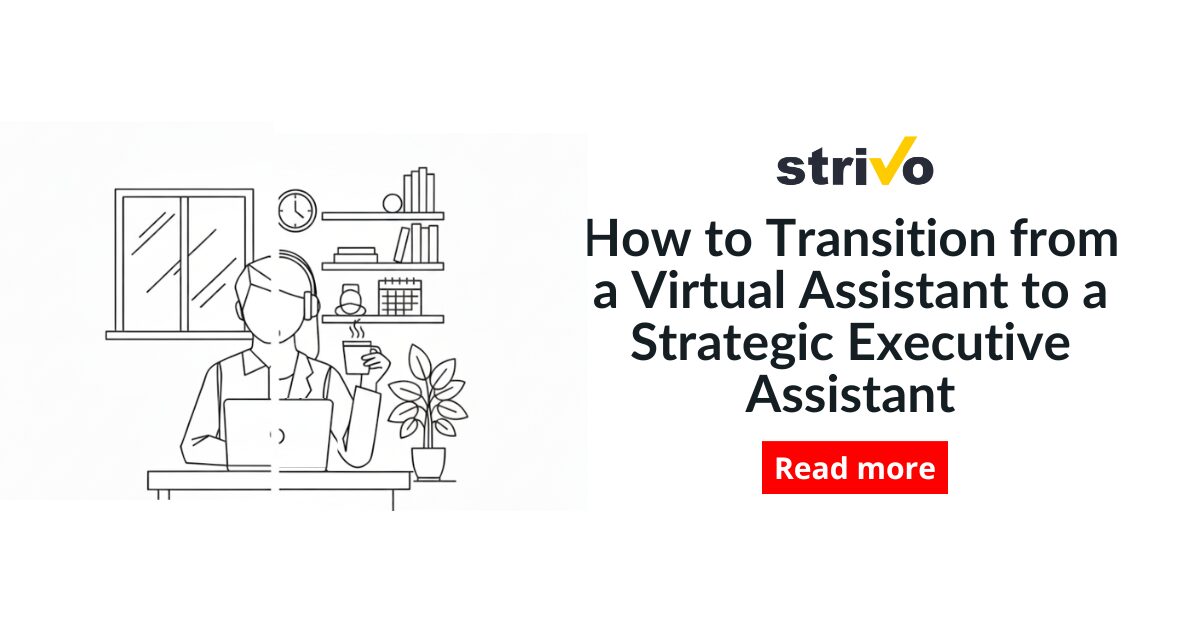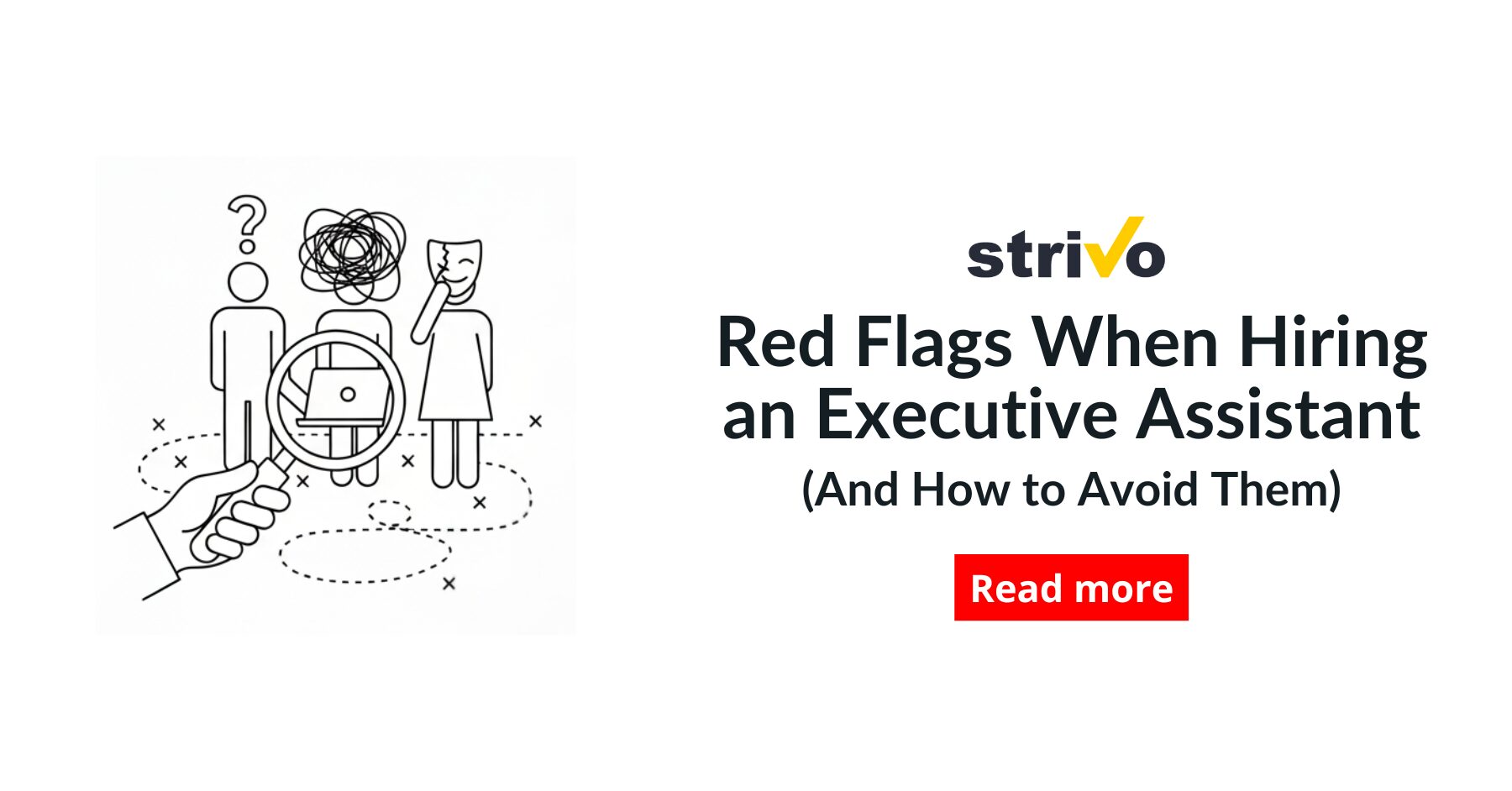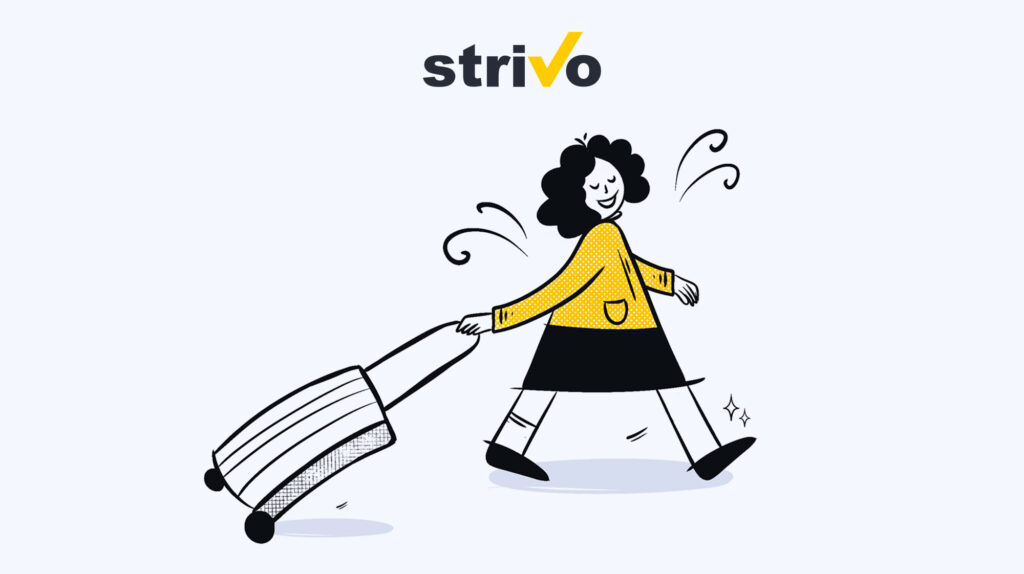Most virtual assistants begin their careers with the basics—calendar management, data entry, email communications, and to-do lists. These are the same common tasks you’ll find in virtual assistant jobs, whether you’re working with multiple clients, handling social media management, or supporting small businesses with time-consuming tasks.
But some assistants feel a deeper pull. They want to move beyond being a task-doer—answering phone calls, maintaining records, or creating email campaigns—and instead step into a bigger role: becoming a trusted strategic partner.
If that’s you, here’s the truth: there is a path from virtual assistant to strategic executive assistant. But it requires a mindset shift, new systems, and the courage to lead alongside your founder.
This is your playbook to leap.
The Difference Between a VA and a Strategic EA
Before the transition, you need clarity on where you’re headed.
Virtual assistants typically:
- Handle administrative services and recurring to-dos
- Work from lists, computer programs, and instructions
- Support multiple clients at once
- Focus on execution and day-to-day tasks
- Often work through a virtual assistant agency or build their own business
Strategic executive assistants, on the other hand:
- Manage their founder’s time, energy, and priorities
- Build and optimize internal systems for project management
- Drive key projects forward and guide career goals
- Act as a sounding board and gatekeeper
- Think several steps ahead
The shift isn’t about the title. Strategic EAs don’t just do work—they orchestrate it.
Steps to Becoming a Strategic Executive Assistant
Now that you understand the difference between a virtual assistant and a strategic executive assistant, it’s time to look at the practical steps that will help you make the shift
Step 1: Start Thinking Like a Second Brain
If your founder’s brain is overloaded, you become the second one.
- Anticipate what they’ll need before they ask
- Create structure where there’s chaos
- Notice patterns and act on them
- Organize information so it’s always findable and usable
Don’t just complete time-consuming tasks. Start predicting. Start solving.
Step 2: Own the Founder’s Calendar Like a Strategic Asset
A basic VA books meetings. A strategic EA designs the founder’s week around impact.
- Audit recurring meetings. Which ones drive results? Which ones drain energy?
- Batch time for deep work, calls, and breaks
- Build white space for thinking—not just doing
- Say no (or not yet) on their behalf when requests don’t align with goals
Step 3: Get to Know the Business
You can’t support a strategy without understanding context.
Learn about:
- The company’s product, market, and potential clients
- The founder’s vision and current priorities
- The team structure and who does what
- The key metrics the business tracks
Step 4: Build Systems That Scale
Strategic EAs are systems people. They design workflows so to do lists become repeatable processes.
- Create a weekly project management pulse (Who’s doing what? Blockers?)
- Set up a task system (ClickUp, Notion, Asana)
- Write SOPs for workflows like onboarding, reporting, or email marketing approvals
- Track decisions so nothing gets lost
Step 5: Manage Up, Not Just Down
Being a strategic EA means you don’t just assist—you lead.
- Proactively flag risks, gaps, or missed opportunities
- Set reminders for professional goals
- Ask, “Is this the best use of your time right now?”
- Hold the founder accountable to their own career path
Step 6: Build a Weekly Executive Rhythm
If there’s no structure, you create it.
Propose a recurring 1:1 with your founder to:
- Review weekly priorities
- Identify what needs delegation
- Bring clarity to chaotic areas
- Surface insights they might miss
Step 7: Step into Confidentiality and Trust
As you move closer to the core of the business, discretion becomes everything.
- Keep founder frustrations private
- Handle sensitive hiring or financial data with care
- Create a safe space in your conversations
- Never forward gossip or drama
Step 8: Communicate Like a Strategist
VAs give updates. Strategic EAs deliver insights.
- Lead with context: “Here’s the issue, here’s the impact, here’s my solution.”
- Write clear, proactive email communications
- Summarize meetings into action steps
- Create engaging content and reports for potential employers or investors
Step 9: Solve Before You’re Asked
This is the hallmark of every great EA: they see a problem and fix it before it becomes a bottleneck. You might:
- Reschedule a meeting if a deadline slips
- Prep a founder for a high-stakes call
- Suggest automation for time-consuming tasks
- Create systems that help save time
Step 10: Lead with Outcomes, Not Just Output
To become a strategic EA, track your wins like a founder would.
Instead of saying:
“I booked 12 meetings and answered 43 emails…”
Say:
“I protected 6 hours of deep work time, supported lead generation, and eliminated a bottleneck in onboarding.”
A Story of the Shift: From Task-Doer to Strategic Ally
Ana started with freelance virtual assistant jobs, juggling admin work for three companies hiring online help. One client—a tech founder—grew quickly. Suddenly, her inbox was full of investor updates, product launches, and email marketing campaigns.
Instead of clocking out, Ana leaned in.
She started running project management trackers, created dashboards, and handled email campaigns. Soon, the founder asked: “Can you help me prep for this board meeting?”
Within six months, Ana went from a remote virtual assistant job to a full-time EA. Today, she helps run a multimillion-dollar business with excellent work-life balance and huge earning potential.
Ready to Step Up?
If you’ve ever felt you could do more—supporting small businesses, managing social media groups, or aligning with your founder’s career goals—you’re ready. The transition isn’t about changing who you are. It’s about expanding your administrative skills and influence.
Start with one system. One mindset shift. One conversation.
And if you want training, coaching, and support along the way?
That’s what Strivo is here for.
We match rigorously vetted assistants with companies hiring for growth. Whether you’re seeking to build experience, find jobs, or step into strategy, we’ll help you reach your professional goals.
Book your 10-minute discovery call with Strivo. We’ll help you become the strategic executive assistant that founders can’t grow without.
Frequently Asked Questions
- What is a virtual assistant?
A virtual assistant is a remote professional who supports businesses with tasks like email, scheduling, research, and social media management. - How do I find virtual assistant jobs?
Look on online platforms, job boards, agencies, and social media groups. Networking also helps. - What’s the average salary of a virtual assistant?
It varies by skills, experience, and location. Specialists in areas like social media or project management earn more. - What are the benefits of becoming a virtual assistant?
Benefits include remote work, work-life balance, flexibility, business growth opportunities, and high earning potential. - What are the most common tasks for virtual assistants?
Tasks include managing emails, scheduling, social media, record keeping, and general admin support. - How do companies hire virtual assistants?
They use agencies, job boards, or social media to find skilled assistants with the right experience. - Can I build a long-term career as a virtual assistant?
Yes. With strong admin skills, you can move from freelance to full-time roles or even start your own agency.





